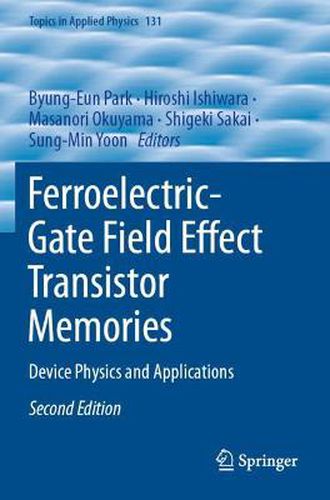Readings Newsletter
Become a Readings Member to make your shopping experience even easier.
Sign in or sign up for free!
You’re not far away from qualifying for FREE standard shipping within Australia
You’ve qualified for FREE standard shipping within Australia
The cart is loading…






This title is printed to order. This book may have been self-published. If so, we cannot guarantee the quality of the content. In the main most books will have gone through the editing process however some may not. We therefore suggest that you be aware of this before ordering this book. If in doubt check either the author or publisher’s details as we are unable to accept any returns unless they are faulty. Please contact us if you have any questions.
This book provides comprehensive coverage of the materials characteristics, process technologies, and device operations for memory field-effect transistors employing inorganic or organic ferroelectric thin films. This transistor-type ferroelectric memory has interesting fundamental device physics and potentially large industrial impact.
Among various applications of ferroelectric thin films, the development of nonvolatile ferroelectric random access memory (FeRAM) has been most actively progressed since the late 1980s and reached modest mass production for specific application since 1995. There are two types of memory cells in ferroelectric nonvolatile memories. One is the capacitor-type FeRAM and the other is the field-effect transistor (FET)-type FeRAM. Although the FET-type FeRAM claims the ultimate scalability and nondestructive readout characteristics, the capacitor-type FeRAMs have been the main interest for the major semiconductor memory companies, because the ferroelectric FET has fatal handicaps of cross-talk for random accessibility and short retention time.
This book aims to provide the readers with development history, technical issues, fabrication methodologies, and promising applications of FET-type ferroelectric memory devices, presenting a comprehensive review of past, present, and future technologies. The topics discussed will lead to further advances in large-area electronics implemented on glass, plastic or paper substrates as well as in conventional Si electronics.
The book is composed of chapters written by leading researchers in ferroelectric materials and related device technologies, including oxide and organic ferroelectric thin films.
$9.00 standard shipping within Australia
FREE standard shipping within Australia for orders over $100.00
Express & International shipping calculated at checkout
This title is printed to order. This book may have been self-published. If so, we cannot guarantee the quality of the content. In the main most books will have gone through the editing process however some may not. We therefore suggest that you be aware of this before ordering this book. If in doubt check either the author or publisher’s details as we are unable to accept any returns unless they are faulty. Please contact us if you have any questions.
This book provides comprehensive coverage of the materials characteristics, process technologies, and device operations for memory field-effect transistors employing inorganic or organic ferroelectric thin films. This transistor-type ferroelectric memory has interesting fundamental device physics and potentially large industrial impact.
Among various applications of ferroelectric thin films, the development of nonvolatile ferroelectric random access memory (FeRAM) has been most actively progressed since the late 1980s and reached modest mass production for specific application since 1995. There are two types of memory cells in ferroelectric nonvolatile memories. One is the capacitor-type FeRAM and the other is the field-effect transistor (FET)-type FeRAM. Although the FET-type FeRAM claims the ultimate scalability and nondestructive readout characteristics, the capacitor-type FeRAMs have been the main interest for the major semiconductor memory companies, because the ferroelectric FET has fatal handicaps of cross-talk for random accessibility and short retention time.
This book aims to provide the readers with development history, technical issues, fabrication methodologies, and promising applications of FET-type ferroelectric memory devices, presenting a comprehensive review of past, present, and future technologies. The topics discussed will lead to further advances in large-area electronics implemented on glass, plastic or paper substrates as well as in conventional Si electronics.
The book is composed of chapters written by leading researchers in ferroelectric materials and related device technologies, including oxide and organic ferroelectric thin films.